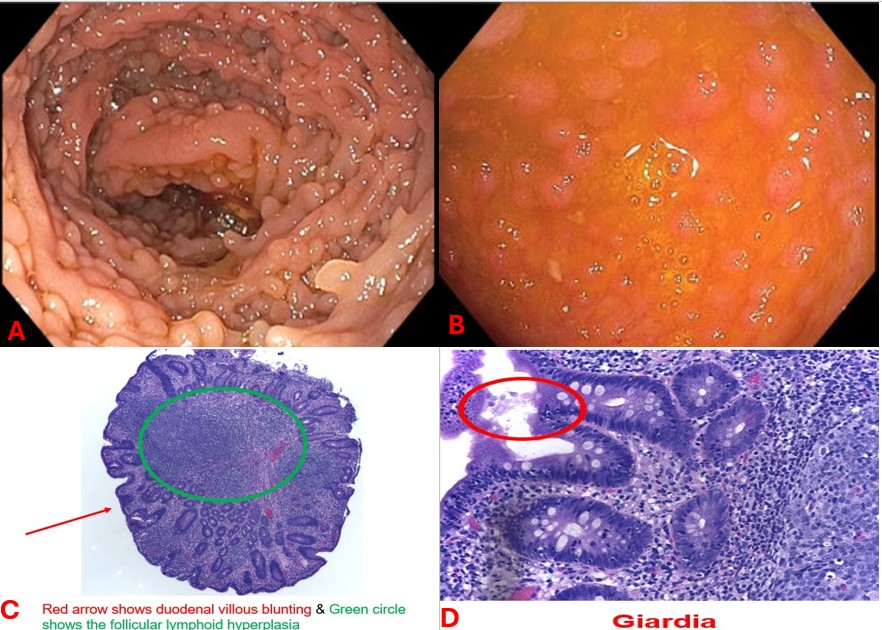Tuesday Poster Session
Category: Small Intestine
P6301 - One Immune Defect, Two GI Manifestations: COVID-Associated Enteropathy and Giardiasis Presenting as Chronic Diarrhea
Tuesday, October 28, 2025
10:30 AM - 4:00 PM PDT
Location: Exhibit Hall
- YE
Yousra Eltagouri, MD (she/her/hers)
Lahey Clinic
Burlington, MA
Presenting Author(s)
Yousra Eltagouri, MD1, Sofia Chaudrey, 2, Karim T.. Osman, MD1
1Lahey Clinic, Burlington, MA; 2Philips Exeter academy, Exeter, NH
Introduction: Common variable immunodeficiency (CVID) is the most common primary immunodeficiency in adults, characterized by impaired B-cell differentiation and immunoglobulin (Ig) deficiencies. Clinical manifestations vary, often involving the gastrointestinal (GI) tract with recurrent infections, enteropathy, liver disease, or malignancies. Due to this variability and unfamiliarity, CVID is often misdiagnosed. We aim to present a case of CVID that highlights the GI manifestations that patients can have.
Case Description/
Methods: A 22-year-old female with asthma and recurrent sinusitis presented with chronic non-bloody diarrhea and abdominal pain. Laboratory evaluation revealed a normal complete blood count and metabolic panel, isolated IgA deficiency, and elevated fecal calprotectin (292 mcg/g). Upper endoscopy showed nodular polypoid mucosa in the duodenum (Figure 1a). Colonoscopy showed normal colonic mucosa but nodular mucosa in the terminal ileum (Figure 1b). Biopsies revealed follicular lymphoid hyperplasia, villous blunting, and a marked decrease in plasma cells (Figure 1c). Giardia organisms were also seen (Figure 1d). Further labs confirmed IgG deficiency and a positive Giardia stool antigen. She was diagnosed with CVID and treated with metronidazole and intravenous immunoglobulin (IVIG) every 4 weeks. Over two years, she developed recurrent giardiasis despite therapy.
Discussion: CVID diagnosis requires Ig deficiency plus compatible clinical features. Recurrent GI infections are common. CVID duodenopathy can mimic celiac disease histologically due to villous blunting and lymphoid hyperplasia; however, plasma cells are markedly reduced or absent, as shown by CD138 staining. Infections may also be directly observed on biopsy. The small bowel and colon are often concurrently affected. IVIG improves systemic manifestations but is less effective for GI manifestations of the disease. Management of GI infections typically requires prolonged or combination antibiotics, with confirmation of clearance in some cases. Targeted therapies for CVID enteropathy include corticosteroids, immunomodulators, anti-tumor necrosis factor agents, anti-integrins, and abatacept, particularly in CTLA-4 deficiency. Multidisciplinary care with immunology, infectious disease, and gastroenterology is essential.

Figure: A. Nodular mucosa in duodenum B. Nodular mucosa in terminal ileum C. Duodenal biopsy: Red arrow shows duodenal villous blunting & Green circle shows follicular lymphoid hyperplasia D. Duodenal biopsy shows Giardia organism
Disclosures:
Yousra Eltagouri indicated no relevant financial relationships.
Sofia Chaudrey indicated no relevant financial relationships.
Karim Osman indicated no relevant financial relationships.
Yousra Eltagouri, MD1, Sofia Chaudrey, 2, Karim T.. Osman, MD1. P6301 - One Immune Defect, Two GI Manifestations: COVID-Associated Enteropathy and Giardiasis Presenting as Chronic Diarrhea, ACG 2025 Annual Scientific Meeting Abstracts. Phoenix, AZ: American College of Gastroenterology.
1Lahey Clinic, Burlington, MA; 2Philips Exeter academy, Exeter, NH
Introduction: Common variable immunodeficiency (CVID) is the most common primary immunodeficiency in adults, characterized by impaired B-cell differentiation and immunoglobulin (Ig) deficiencies. Clinical manifestations vary, often involving the gastrointestinal (GI) tract with recurrent infections, enteropathy, liver disease, or malignancies. Due to this variability and unfamiliarity, CVID is often misdiagnosed. We aim to present a case of CVID that highlights the GI manifestations that patients can have.
Case Description/
Methods: A 22-year-old female with asthma and recurrent sinusitis presented with chronic non-bloody diarrhea and abdominal pain. Laboratory evaluation revealed a normal complete blood count and metabolic panel, isolated IgA deficiency, and elevated fecal calprotectin (292 mcg/g). Upper endoscopy showed nodular polypoid mucosa in the duodenum (Figure 1a). Colonoscopy showed normal colonic mucosa but nodular mucosa in the terminal ileum (Figure 1b). Biopsies revealed follicular lymphoid hyperplasia, villous blunting, and a marked decrease in plasma cells (Figure 1c). Giardia organisms were also seen (Figure 1d). Further labs confirmed IgG deficiency and a positive Giardia stool antigen. She was diagnosed with CVID and treated with metronidazole and intravenous immunoglobulin (IVIG) every 4 weeks. Over two years, she developed recurrent giardiasis despite therapy.
Discussion: CVID diagnosis requires Ig deficiency plus compatible clinical features. Recurrent GI infections are common. CVID duodenopathy can mimic celiac disease histologically due to villous blunting and lymphoid hyperplasia; however, plasma cells are markedly reduced or absent, as shown by CD138 staining. Infections may also be directly observed on biopsy. The small bowel and colon are often concurrently affected. IVIG improves systemic manifestations but is less effective for GI manifestations of the disease. Management of GI infections typically requires prolonged or combination antibiotics, with confirmation of clearance in some cases. Targeted therapies for CVID enteropathy include corticosteroids, immunomodulators, anti-tumor necrosis factor agents, anti-integrins, and abatacept, particularly in CTLA-4 deficiency. Multidisciplinary care with immunology, infectious disease, and gastroenterology is essential.

Figure: A. Nodular mucosa in duodenum B. Nodular mucosa in terminal ileum C. Duodenal biopsy: Red arrow shows duodenal villous blunting & Green circle shows follicular lymphoid hyperplasia D. Duodenal biopsy shows Giardia organism
Disclosures:
Yousra Eltagouri indicated no relevant financial relationships.
Sofia Chaudrey indicated no relevant financial relationships.
Karim Osman indicated no relevant financial relationships.
Yousra Eltagouri, MD1, Sofia Chaudrey, 2, Karim T.. Osman, MD1. P6301 - One Immune Defect, Two GI Manifestations: COVID-Associated Enteropathy and Giardiasis Presenting as Chronic Diarrhea, ACG 2025 Annual Scientific Meeting Abstracts. Phoenix, AZ: American College of Gastroenterology.
